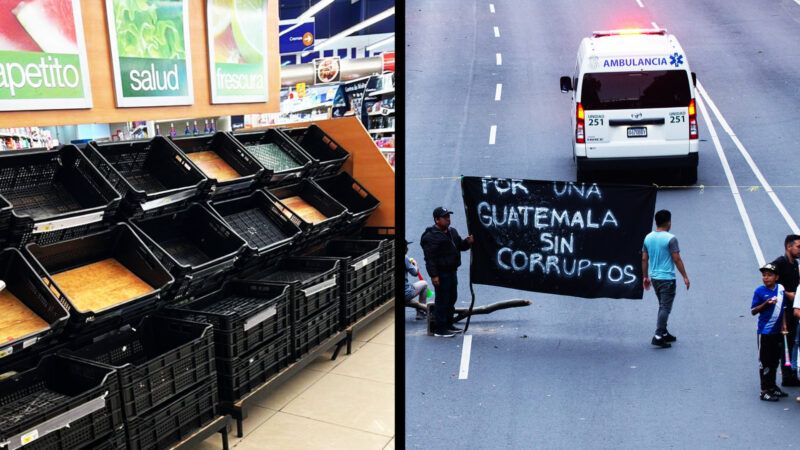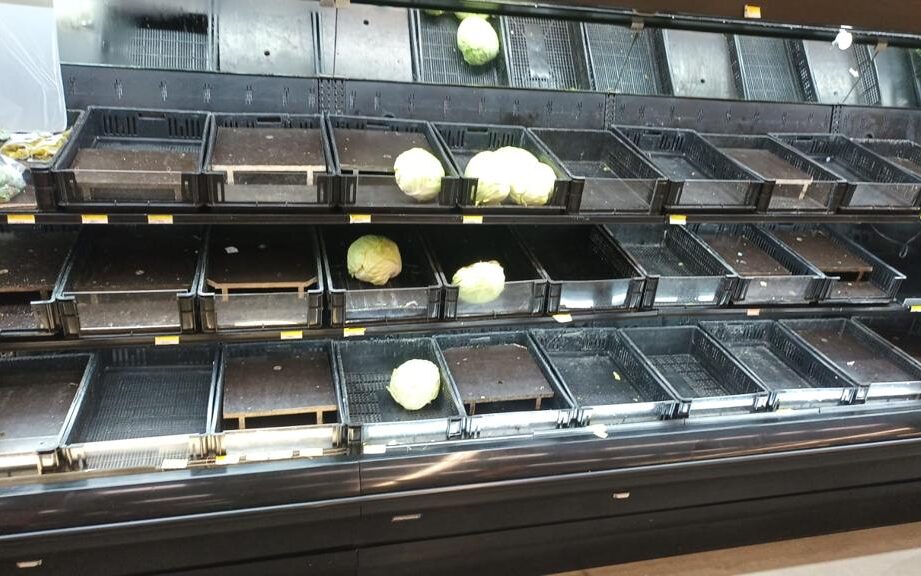In Guatemala, Protests Have Brought Economic Life to a Halt
Few doubt the right of Guatemalans to protest. The challenge arises when protests exact a heavy toll on the well-being of its citizens.

Millions of bananas are rotting in containers across Guatemala as the region's largest economy grinds to a halt. Over the past 16 days, protests have left millions of Guatemalans confined to their homes, while the country runs out of food, fuel, and water.
The nationwide protests seek the resignation of Attorney General Consuelo Porras and other public authorities who are accused of undermining democracy and attempting to prevent President-elect Bernardo Arévalo, who ran on an anti-corruption platform, from taking office in January.
The turmoil began in 2022, when the Public Ministry launched an investigation against Movimiento Semilla, Arévalo's party, alleging that it used fraudulent signatures to register the party. Despite intensified scrutiny, Arévalo secured victory in the second round of the August election this year with 58 percent of the votes, although only 45 percent of registered voters participated.
In September, the attorney general's office raided the Supreme Electoral Tribunal's office and seized the electoral records, which have been under examination due to reported "irregularities" during the election process. In response, Arévalo accused Porras of staging a coup d'etat and called on his supporters to take to the streets.
The result has been over 120 roadblocks in 19 of the 22 departments of Guatemala, cutting access to the country's main roads, ports, airports, and borders. Without being able to move, Guatemalans can't go to work and businesses have had no other option than to close their doors. The few establishments that have managed to stay open have been threatened by demonstrators who demand they show solidarity with the movement or else.
According to the Guatemalan Chamber of Commerce, approximately 70 percent of the country's restaurants have closed during these two weeks, four out of five hotel reservations have been canceled, and more than 7,000 containers remain stuck at the ports.
"Road blockades are especially harmful in places like Guatemala, where there are no alternative forms of transportation to the vehicles that travel on the roads," explains Daniel Fernández, professor of economics at Universidad Francisco Marroquín.
Supermarket shelves now sit empty, while prices of available goods have skyrocketed. Staple foods have tripled in cost—a pound of potatoes that used to cost $0.50 a week ago, now costs $1.78.

Water delivery trucks—a key source of drinking water in a country with minimal infrastructure—have been unable to reach neighborhoods. This has been exacerbated by demonstrators intentionally disrupting the water supply to sections of Guatemala City.
The blockades have also led to a shortage of both essential supplies, such as medicines and surgical materials, and doctors, putting the lives of patients and health professionals at risk.
"Every day that passes is more and more lost. One more week of this can mean bankruptcy.…I have already lost more than $360,000," says an exporter of bananas in the eastern part of the country. "Last week I lost 15 containers, and this week it will be approximately 25 containers. The approximate losses are $9,000 per container," he adds. With his containers stranded and the produce ripening, he has no other choice than to discard the bananas.
It is a big loss for him as well as his employees. "I have to pay payroll, but we don't have any cash flow without being able to export. All our employees are being suspended because there is no money to pay them."
Guatemala's economy is practically at a standstill, explains José Carlos Ortega, executive director of Instituto de Servicios a la Nación. "The protests have affected many…but who it affects the most are small companies and medium-sized companies with employees and fixed costs. It also affects those who earn on commission or per day worked," he says.
The banana industry is just one of the many industries that are being affected by the blockade. The Guatemalan Chamber of Commerce estimates the economic loss of 11 days of blockades is already in the millions of dollars. Experts at the Guatemalan central bank say the impacts are long-lasting, affecting economic growth, investment, and inflation.
Few doubt the right of Guatemalans to protest. The challenge arises when protests exact a heavy toll on the well-being of its citizens. Ironically, the politicians who sparked the protests are least affected by such movements, leaving ordinary citizens to shoulder the consequences.
In 2015, Guatemala witnessed a different kind of protest: For months, Guatemalans poured onto the streets in opposition to rampant corruption. Families, students, workers, and businessmen, representing a cross-section of Guatemalan society, stood side by side outside the national palace calling for a change.
The protests were successful, leading to the ousting of then-president Otto Pérez Molina and his vice president. The protests were characterized by their peaceful nature, preserving the rights of the average Guatemalan while targeting only the politicians. It was a strikingly different environment from what the people of Guatemala are living through today.
Protest leaders have said that the current blockades will continue indefinitely. While the outcome of the protests remains unclear, one thing is certain: They are not sustainable. What initially began as a movement to safeguard democracy and protect citizens from corruption is now hurting those it sought to protect.
Editor's Note: As of February 29, 2024, commenting privileges on reason.com posts are limited to Reason Plus subscribers. Past commenters are grandfathered in for a temporary period. Subscribe here to preserve your ability to comment. Your Reason Plus subscription also gives you an ad-free version of reason.com, along with full access to the digital edition and archives of Reason magazine. We request that comments be civil and on-topic. We do not moderate or assume any responsibility for comments, which are owned by the readers who post them. Comments do not represent the views of reason.com or Reason Foundation. We reserve the right to delete any comment and ban commenters for any reason at any time. Comments may only be edited within 5 minutes of posting. Report abuses.
Please to post comments


Imagine if the Westboro Baptist Church did what these protesters are doing.
I wonder why – – – – – –
Currently there are 547,000 registered firearms in Guatemala (or 3 per 100 people). 60,658 people have license to carry them.
Rules regarding carrying firearms are more strict with additional permit required and minimum age being 25 years. Only about 10% of legal guns can be carried in public places.
It is a capital mistake to extrapolate from Guatemala City to the country at large.
Few doubt the right of Guatemalans to protest. The challenge arises when protests exact a heavy toll on the well-being of its citizens.
Is this a veiled support of Justin Trudeau's crackdown?
This article can only be read as a gestalt or atomically indivisible unified whole.
Implications with regard to Canada as a third world shithole, mostly peaceful protests that did nothing to the economy, or blatant politically-motivated persecutions of insurrectionists in totally-not-corrupt puppet regimes are all non-sequitur.
Perhaps the economic consequences Guatemalans are enduring are worth it to them in order to oust corrupt politicians? This article seems to tout the notion that liberty and corruption-free government are not worth the economic pain. I wonder what craven opportunist thought of that idea?
Charles Koch?
The "economic pain" you are referring to includes a lack of food and water and, at least implied, intimidation of citizens who do not share the protesters passion for this cause.
Families, students, workers, and businessmen, representing a cross-section of Guatemalan society, stood side by side outside the national palace calling for a change.
The protests were successful, leading to the ousting of then-president Otto Pérez Molina and his vice president. The protests were characterized by their peaceful nature, preserving the rights of the average Guatemalan while targeting only the politicians.
Wait, I'm confused, when did the corrupt, ousted regime of a 3rd world shithole arrest and charge over a 1,000 protestors representing a cross-section of society for protesting outside the palace in a specifically-politically-oriented protest?
I have learned an important lesson. What you call the protest is paramount.
Attack on the Capitol.
Pro-democracy protest.
Flip a coin.
What you call the protest is paramount.
And by "you" you mean the royal "you".
Taking over part of a city and calling it an "autonomous zone" (i.e. self governing), while keeping police and emergency services vehicles out so people die = "mostly peaceful protest."
Trespassing on public property to protest for election integrity while multiple protestors die at the hands of the police = "violent and deadly insurrection."
Maybe using the power of government to go after political opponents shouldn't be ignored until these large scale events occur.
Today Guatemala, tomorrow Des Moines.
This is the trouble with Reason's brand of libertarianism. It doesn't seek freedom as its main goal, it seeks money (usually for rich people like the Kochs) as its main goal.
Blockades are acts of aggression. Arrest or shoot them.
This. Protest all you like, but if you block the road, I'm driving through anyway.
Same response to you
Fuck off freedom hater. When the war starts crybabies like you will be crying about not being able to use the roads or parks. So you want a war or protests loser?
A blockade (except a temporary one arranged through a parade permit, ie a "peaceable assembly") is an act of war.
(2) Admittedly, a foreign country like Guatemala does not have our First Amendment or parade permit laws, but "temporary" suggests a general principle. On the other hand, wars are sometimes justified.
Humans are corrupt to the core. The shadow government of any country will never allow peaceful reform.
If you don't want to get run over, don't protest on the freeway.
Bernardo Arévalo, Bernardo Arévaloprogressive.
That's the description. And the usual suspects are leftishly backing his leftist ass.
Which suggests that the 'corruption' he's fighting against is election integrity and a working economic system.
Interestingly, while Arévalo has lots of fawning articles in english, pretty much everything about the woman trying to stop him is in Spanish.
Consuelo Porras is relegated to an 'enemy of the left' status.
Ah, Reason, never saw a commie they didn't fellate.
> Ah, Reason, never saw a commie they didn’t fellate.
I am baffled why you are denouncing "Reason" here. This article is more likely to annoy the Left, who I gather are the people behind Guatemala's blockades.